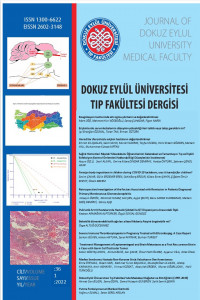Öz
Although a year has passed since the epidemic started, all the world is still affected by COVID-19 infection. Not only COVID-19 infection but pandemic has led many global healthcare problems. We noticed high number of admissions to pediatric emergency department (PED) with gastrointestinal foreign body ingestions (FBIs). The aim of this study was to evaluate the effect of restrictions on FBIs.
Materials and Methods: A retrospective review of patients aged under 18 years who admitted with FBI to our PED was performed. Two national lockdown periods April 3-June 1, 2020 and November 18, 2020- January 18, 2021 were evaluated. Demographic characteristics, number and type of FBIs and endoscopic procedures were recorded. Data from the same periods of the previous year was collected and compared.
Results: A total of 168 cases (94 in lockdown periods) were evaluated. The number of FBIs was not significantly higher in 2020 but the ratio of FBIs to PED visits was significantly higher in lockdown periods (p=0.001). The number of endoscopic procedure and type of FBIs were similar (p=0.151, p=0.965). The number of FBIs and time to hospital admission increased in second pandemic period (p=0.018, p=0.006).
Conclusion: This study highlights a remarkable higher rate of FBIs related admissions in a PED during pandemic period but the numbers of total or high- risk FBIs was not significantly higher.
Anahtar Kelimeler
Kaynakça
- 1. Chaiyachati BH, Agawu A, Zorc JJ, Balamuth F. Trends in Pediatric Emergency Department Utilization after Institution of Coronavirus Disease-19 Mandatory Social Distancing. J Pediatr 2020; 20: 274–277.
- 2. Bressan S, Gallo E, Tirelli F, Gregori D, Da Dalt L. Lockdown: more domestic accidents than COVID-19 in children. Arch Dis Child.2021;106: 319547.
- 3. Wong, TWK, Hung, JWS, Leung, MWY. Pediatric domestic accidents during COVID-19 pandemic in Hong Kong. Surg Pract. 2021;25: 32– 37.
- 4. Festa NT, Thakkar H, Hewitt R, et al. Foreign body ingestion during the COVID-19 pandemic: a retrospective single centre review. BMJ Pediatr Open. 2021;5(1):e001042. Published 2021 Jul 26. doi:10.1136/bmjpo-2021-001042.
- 5. Pizzol A, Rigazio C, Calvo PL, et al. Foreign-body Ingestions in Children During COVID-19 Pandemic in a Pediatric Referral Center. JPGN.2020;11: 1(2).
- 6. Bucci C, Caruso F, Quitadamo P, et al. COVID-19 lockdown led to fewer ingestion cases but a higher percentage of more serious cases needed hospitalisation. Acta Pediatr.2021;110:1293-1294.
- 7. Brown SM, Doom JR, Lechuga-Peña S, Watamura SE, Koppels T. Stress and parenting during the global COVID-19 pandemic. Child Abuse Negl.2020;110: 104699.
Öz
Although a year has passed since the epidemic started, all the world is still affected by COVID-19 infection. Not only COVID-19 infection but pandemic has led many global healthcare problems. We noticed high number of admissions to pediatric emergency department (PED) with gastrointestinal foreign body ingestions (FBIs). The aim of this study was to evaluate the effect of restrictions on FBIs.
Materials and Methods: A retrospective review of patients aged under 18 years who admitted with FBI to our PED was performed. Two national lockdown periods April 3-June 1, 2020 and November 18, 2020- January 18, 2021 were evaluated. Demographic characteristics, number and type of FBIs and endoscopic procedures were recorded. Data from the same periods of the previous year was collected and compared.
Results: A total of 168 cases (94 in lockdown periods) were evaluated. The number of FBIs was not significantly higher in 2020 but the ratio of FBIs to PED visits was significantly higher in lockdown periods (p=0.001). The number of endoscopic procedure and type of FBIs were similar (p=0.151, p=0.965). The number of FBIs and time to hospital admission increased in second pandemic period (p=0.018, p=0.006).
Conclusion: This study highlights a remarkable higher rate of FBIs related admissions in a PED during pandemic period but the numbers of total or high- risk FBIs was not significantly higher.
Anahtar Kelimeler
Kaynakça
- 1. Chaiyachati BH, Agawu A, Zorc JJ, Balamuth F. Trends in Pediatric Emergency Department Utilization after Institution of Coronavirus Disease-19 Mandatory Social Distancing. J Pediatr 2020; 20: 274–277.
- 2. Bressan S, Gallo E, Tirelli F, Gregori D, Da Dalt L. Lockdown: more domestic accidents than COVID-19 in children. Arch Dis Child.2021;106: 319547.
- 3. Wong, TWK, Hung, JWS, Leung, MWY. Pediatric domestic accidents during COVID-19 pandemic in Hong Kong. Surg Pract. 2021;25: 32– 37.
- 4. Festa NT, Thakkar H, Hewitt R, et al. Foreign body ingestion during the COVID-19 pandemic: a retrospective single centre review. BMJ Pediatr Open. 2021;5(1):e001042. Published 2021 Jul 26. doi:10.1136/bmjpo-2021-001042.
- 5. Pizzol A, Rigazio C, Calvo PL, et al. Foreign-body Ingestions in Children During COVID-19 Pandemic in a Pediatric Referral Center. JPGN.2020;11: 1(2).
- 6. Bucci C, Caruso F, Quitadamo P, et al. COVID-19 lockdown led to fewer ingestion cases but a higher percentage of more serious cases needed hospitalisation. Acta Pediatr.2021;110:1293-1294.
- 7. Brown SM, Doom JR, Lechuga-Peña S, Watamura SE, Koppels T. Stress and parenting during the global COVID-19 pandemic. Child Abuse Negl.2020;110: 104699.
Ayrıntılar
| Birincil Dil | Türkçe |
|---|---|
| Konular | Klinik Tıp Bilimleri |
| Bölüm | Araştırma Makaleleri |
| Yazarlar | |
| Yayımlanma Tarihi | 30 Nisan 2022 |
| Gönderilme Tarihi | 21 Aralık 2021 |
| Yayımlandığı Sayı | Yıl 2022 Cilt: 36 Sayı: 1 |


